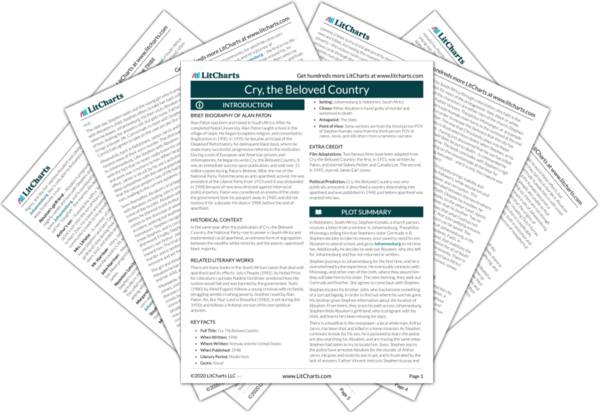When the land and tribe are corrupted, and the city and the country are pitted against one another, it follows that families will break apart. Throughout the novel, families are torn to pieces, particularly fathers and sons. In particular, the novel explores two significant father/son relationships: that of Stephen Kumalo and his son Absalom Kumalo, and that of James Jarvis, and his son Arthur Jarvis. Both sons vanish to Johannesburg, and their fathers come to find them only after something terrible has happened – Arthur is shot dead in a house invasion, and Absalom is his killer. Both fathers, then, seek to understand something about their sons and their sons’ circumstances. Stephen struggles to come to terms with his child killing another person, and, by extension, what has happened to his country and the brutal cycle in which they are all trapped. James attempts to get to know his son through his son’s papers and library, things he did not know about him before his death. Both fathers grieve, and their losses are only truly reconciled when James helps Stephen rebuild his church, and Stephen befriends the late Arthur’s young son. The city of Johannesburg tore both of their families apart, but outside of the city's borders, broken families can heal.
Fathers, Sons, and Families ThemeTracker

Fathers, Sons, and Families Quotes in Cry, the Beloved Country
The journey had begun. And now the fear back again, the fear of the unknown, the fear of the great city where boys were killed crossing the street, the fear of Gertrude’s sickness. Deep down the fear for his son. Deep down the fear of a man who lives in a world not made for him, whose own world is slipping away, dying, being destroyed, beyond any recall.
The tragedy is not that things are broken. The tragedy is that they are not mended again… It suited the white man to break the tribe… but it has not suited him to build something in the place of what is broken.
There is not much talking now. A silence falls upon them all. This is no time to talk of hedges and fields, or the beauties of any country. Sadness and fear and hate, how they well up in the heart and mind, whenever one opens pages of these messengers of doom. Cry for the broken tribe, for the law and the custom that is gone. Aye, and cry aloud for the man who is dead, for the woman and children bereaved. Cry, the beloved country, these things are not yet at an end. The sun pours down on the earth, on the lovely land that man cannot enjoy. He knows only the fear of his heart.
Some cry for the cutting up of South Africa without delay into separate areas, where white can live without black, and black without white, where black can farm their own land and mine their own minerals and administer their own laws. And others cry away with the compound system, that brings men to the towns without their wives and children, and breaks up the tribe and the house and the man, and they ask for the establishment of villages for the labourers in mines and industry.
For mines are for men, not for money. And money is not something to go mad about, and throw your hat into the air for. Money is for food and clothes and comfort, and a visit to the pictures. Money is to make happy the lives of children. Money is for security, and for dreams, and for hopes, and for purposes. Money is for buying the fruits of the earth, of the land where you were born.
The Judge rises, and the people rise. But not all is silent. The guilty one falls to the floor, crying and sobbing. And there is a woman wailing, and an old man crying Tixo, Tixo. No one calls for silence, though the Judge is not quite gone. For who can stop the heart from breaking?
He had come to tell his brother that power corrupts, that a man who fights for justice must himself be cleansed and purified, that love is greater than force. And none of these things had he done… He turned to the door, but it was locked and bolted. Brother had shut out brother, from the same womb had they come.
… he prayed for his son. Tomorrow they would all go home, all except his son. And he would stay in the place where they would put him, in the great prison in Pretoria, in the barred and solitary cell; and mercy failing, would stay there till he was hanged. Aye, but the hand that had murdered once pressed the mother’s breast into the thirsting mouth, had stolen into the father’s hand when they went out in the dark. Aye, but the murderer afraid of death had once been a child afraid of the night.
















